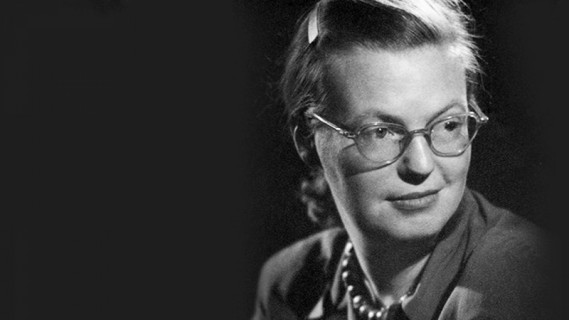
Note to readers: This post was inspired partly by Rebecca Makkai's admission that she kept a copy of The Haunting of Hill House on her desk while writing The Hundred-Year House. Makkai visits Lighthouse this weekend for a series of workshops and events.
 (…which I finally read, having heard enough times from friends who know my penchant for old ghost stories, "What? You've never read The Haunting of Hill House?")
(…which I finally read, having heard enough times from friends who know my penchant for old ghost stories, "What? You've never read The Haunting of Hill House?")
1) Wait for a stretch of rainy, bleak days.
2) Have a bottle of brandy at the ready, because the characters will be drinking lots of it; it's how they settle their nerves, and you'll find yourself craving it too—even if you don't like brandy, or have never tasted it.
3) Set off to Hill House with Eleanor, taking note of how her mind wends: The road, her intimate friend now, turned and dipped, going around turns where surprises waited—once a cow, regarding her over a fence, once an incurious dog—down into hallows where small towns lay, past fields and orchards. On the main street of one village she passed a vast house, pillared and walled, with shutters over the windows and a pair of stone lions guarding the steps, and she thought that perhaps she might live there, dusting the lions each morning and patting their heads good night. Time is beginning this morning in June, she assured herself, but it is a time that is strangely new and of itself; in these few seconds I have lived a lifetime in a house with two lions in front. Every morning I swept the porch and dusted the lions, and every evening I patted their heads good night, and once a week I washed their faces and manes and paws with warm water and soda and cleaned between their teeth with a swab… Take her detours and musings as permission, in your own work, to delve into character and see where you wind up. (Okay, fine, I'm talking to myself here, because I sometimes hear a voice inside my head telling me to stick to the story, stay on track, and I found the pages in which Eleanor is simply making her slow way to her destination a refreshing example of how internal glimpses can add depth to plot.)
4) Settle into Hill House, via: No human eye can isolate the unhappy coincidence of line and place which suggest evil in the face of a house, and yet somehow a maniac juxtaposition, a badly turned angle, some chance meeting of roof and sky, turned Hill House into a place of despair, more frightening because the face of Hill House seemed awake, with a watchfulness from the blank windows and a touch of glee in the eyebrow of a cornice. Didn't someone advise you never to anthropomorphize? Well, forget that advice. Let Jackson's descriptions inspire you to personify your heart out (Your heart, with little arms and legs!), if you want to. Also, check out Jackson's range when it comes to point of view, how she often employs omniscience when describing the house, then drops into close third, then (see #3) drops deeper still into first-person musings to let us see what the house is doing to poor Eleanor's state of mind.
5) Be inspired to think outside the box when it comes to backstory: …one day, when [Eleanor] was twelve years old and her sister was eighteen, and their father had been dead for not quite a month, showers of stones had fallen on their house, without any warning or any indication of purpose or reason, dropping from the ceilings, rolling loudly down the walls, breaking windows and pattering maddeningly on the roof. The stones continued intermittently for three days, during which time Eleanor and her sister were less unnerved by the stones than by the neighbors and sightseers who gathered daily outside the front door... (WTF?!) A past episode of that sort could serve to explain a lot about a character.
6) Don't worry, as you're reading, about what you're reading—whether it's literary or genre, highbrow or low. Forget even that there are categories such as these and worry, instead, about that cold, invisible presence that's making its way toward Eleanor's door, wanting in. (Time to pour a snifter of that brandy!)
7) Make sure, after finishing the book, that your Lighthouse evening class doesn't run late, so that you're not one of the last few in the house on Race Street, which, though we all know it as warm and welcoming, becomes ominous and eerily quiet once the writers file out. (So that you don't find yourself alone in the dark back stairwell, calling up to an empty attic: Hello? Hello? Is anyone left up there?)
This post is part of our Lit Matters series, in which writers and readers express why supporting and elevating literary arts is meaningful to them. Lit Matters stories will be posted throughout the month of November, leading up to Colorado Gives Day on December 9. Mark your calendar for Colorado Gives Day or schedule your gift now. Thank you!

